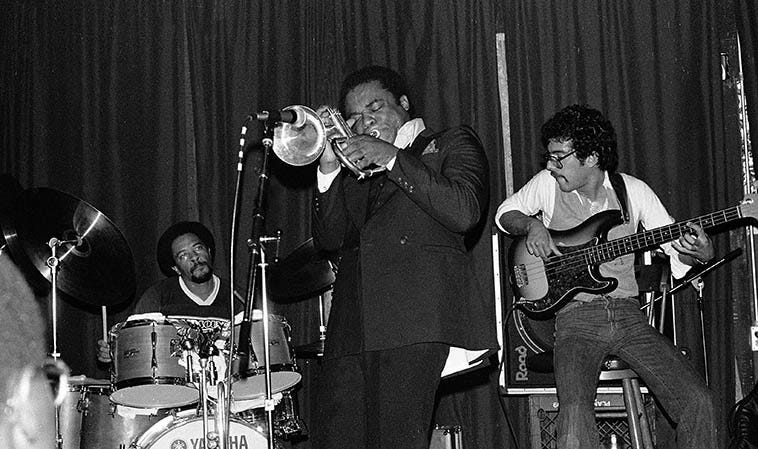In 1976, when I was in college and playing in bands around Los Angeles, the pre-existing system of coming through playing with the “masters” as a way of developing as a jazz musician, and a general rite of passage that had been in place for decades, was still in place, and the way that a young player could find their own voice, while learning many non-empirical aspects of the craft that are difficult to be taught in an academic context . When I began playing gigs around Los Angeles, the first “master” that I got hired by was the incredible percussionist and drummer Willie Bobo. Willie came up in New York, studying and working with Machito and Mongo Santamaria.
After spending a period of time working with Willie, and learning about how to play in the context and style of what Willie described as “Black-Puerto Rican” or “Spookarican” music, I got an offer from the great jazz trumpet player and composer Freddie Hubbard to play with him. I had grown up spending hours, days, and weeks listening to, and playing along with all of Freddie’s playing and writing on his albums as well as all of his playing as a sideman in Art Blakey’s band and the multitude of other records that he played on as a guest or sideman.
Getting this offer was a dream for me, but meant that I would be moving out of the pursuit of a degree in college, and into the world of learning though apprenticeship. My audition was very simple. I went to Freddie’s house and played a couple of songs with him. He played a beat-up Fender Rhodes and I of course played bass. We sat and talked about music; not in a technical sense, but in more of philosophical sense. I felt that sense that one feels when they are in the right place at the right time in their lives. This conversation was my introduction to the Freddie who was a generous and wise taskmaster. This part of his nature became a characteristic of one of the parts of Freddie that came to feel like one of two step-fathers of a sort. This step-father was a gracious and demanding master, who taught me how to think about the shape and architecture of jazz, and who required that I assimilated what he taught every night that we played. He would give me the freedom to explore and invent in approaching his music and the standard tunes that we worked with, but without saying so, expected me to go beyond what I already knew how to do. I left his house that first day with a sense of the opportunity to ascend to the highest level of musical discovery, and an air-ticket to New York City in my pocket.
A few days later I arrived in New York, for a week-long run at The Village Gate. I checked into the Wellington Hotel on 7th Avenue. It was an old hotel; one that had a dusty and worn quality that the stratum of New York hotels that have been neglected for many years; long overdue for a renovation, possess.
It was my first visit to New York City, having grown up in a middle class and suburban world, where Palm Springs and Newport Beach were the furthest that we traveled on vacations. I vividly recall walking into my dark and somewhat stuffy room, setting my suitcase down, and flopping down onto a bed that was outfitted with an ancient and lumpy mattress, long in need of replacement.
The Guardian Teacher
As I lay there, going through all of the great songs of Freddie’s that he might call on that first night with the band, the hotel phone rang. It was Freddie, “hey… how was your flight?….what do you think about going for a walk?…. I’ll meet you in the lobby in 10 minutes.” I put a coat on and walked down the Barton Fink-esque hallway to the elevator, and once down in the lobby looked for Freddie. A few minutes later he walked out of the other elevator. “Let’s go down 7th Avenue…. that’s a good introduction to The City.” As we walked down the street, after a couple of blocks we came to a corner with a red light. As the light changed, I went to step off of the curb and cross the street. Simultaneously, I felt a hand grab the collar of my coat, and pull me back onto the sidewalk. A taxi roared by, running the light in what I came to realize was an endemic part of life in New York City. On my first walk in NYC, on my first trip to the city my musical hero had just literally saved my life. As we walked down 7th Avenue I was filled with a mixture of embarrassment, gratitude and a sense of the surreal quality of the “movie” of my first day on the road with undoubtedly one of the greatest trumpet players in jazz history.




